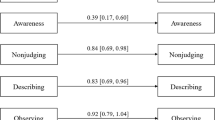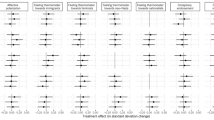Abstract
The present study examines how sojourners’ paranoia mediates the negative relationship between their distrust toward host nationals and sociocultural adaptation, and how sojourners’ neuroticism moderates this mediated relationship. By conducting a two-part survey study with U.S. undergraduate students who traveled abroad for academic programs, I found that only among neurotic sojourners, distrust toward host nationals was negatively related to sociocultural adaptation, mediated by paranoia. These findings suggest that distrust-related cognition and emotion as well as neuroticism are all important predictors of sociocultural adaptation, and shed light on the inquiry regarding sojourners’ adaptation and distrust/trust.


Similar content being viewed by others
References
Ang, S., Van Dyne, L., Koh, C., Ng, K. Y., Templer, K. J., Tay, C., & Chandrasekar, N. A. (2007). Cultural intelligence: its measurement and effects on cultural judgment and decision making, cultural adaptation and task performance. Management and Organization Review, 3, 335–371. doi:10.1111/j.1740-8784.2007.00082.x.
Ashleigh, M. J., Higgs, M., & Dulewicz, V. (2012). A new propensity to trust scale and its relationship with individual well-being: implications for HRM policies and practices. Human Resource Management Journal, 22, 360–376. doi:10.1111/1748-8583.12007.
Bar-Tal, D. (2007). Sociopsychological foundations of intractable conflicts. American Behavioral Scientist, 50, 1430–1453. doi:10.1177/0002764207302462.
Black, J. S., & Stephens, G. K. (1989). The influence of the spouse on American expatriate adjustment and intent to stay in Pacific Rim overseas assignments. Journal of Management, 15, 529–544. doi:10.1177/014920638901500403.
Brisset, C., Safdar, S., Lewis, J. R., & Sabatier, C. (2010). Psychological and sociocultural adaptation of university students in France: the case of Vietnamese international students. International Journal of Intercultural Relations, 34, 413–426. doi:10.1016/j.ijintrel.2010.02.009.
Chan, M. E., & McAllister, D. J. (2014). Abusive supervision through the lens of employee state paranoia. Academy of Management Review, 39, 44–66.
Chen, A. S. –. Y., Lin, Y.–. C., & Sawangpattanakul, A. (2011). The relationship between cultural intelligence and performance with the mediating effect of cultural shock: A case from Philippine laborers in Taiwan. International Journal of Intercultural Relations, 35, 246–258. doi:10.1016/j.ijintrel.2010.09.005.
Cheng, C. -Y., & Leung, A. K. -Y. (2012). Revisiting the multicultural experience-creativity link: the effects of perceived cultural distance and comparison mind-set. Social Psychological and Personality Science, 4, 475–482. doi:10.5465/amr.2011.0419.
Church, A. T., & Burke, P. J. (1994). Exploratory and confirmatory tests of the big five and Tellegen’s three- and four-dimensions models. Journal of Personality and Social Psychology, 66, 93–114. doi:10.1037/0022-3514.66.1.93.
Cotton, S. J., Dollard, M. F., & de Jonge, J. (2002). Stress and student job design: Satisfaction, well-being, and performance in university students. International Journal of Stress Management, 9, 147–162. doi:10.1023/A:1015515714410.
Davison, A. C., & Hinkley, D. V. (1997). Bootstrap methods and their application. Cambridge, UK: Cambridge University Press.
Demes, K. A., & Geeraert, N. (2015). The highs and lows of a cultural transition: A longitudinal analysis of sojourner stress and adaptation across 50 countries. Journal of Personality and Social Psychology, 109, 316–337. doi:10.1037/pspp0000046.
Derogatis, L. R., & Melisaratos, N. (1983). The brief symptom inventory: an introductory report. Psychological Medicine, 13, 595–605. doi:10.1017/S0033291700048017.
DeYoung, C. G. (2006). Higher-order factors of the big five in a multi-informant sample. Journal of Personality and Social Psychology, 91, 1138–1151. doi:10.1037/0022-3514.91.6.1138.
Dimoka, A. (2010). What does the brain tell us about trust and distrust? evidence from a functional neuroimaging study. MIS Quarterly, 34, 373–396.
Dunn, J. R., & Schweitzer, M. E. (2005). Feeling and believing: the influence of emotion on trust. Journal of Personality and Social Psychology, 88, 736–748. doi:10.1037/0022-3514.88.5.736.
Efron, B. (1988). Bootstrap confidence intervals: good or bad? Psychological Bulletin, 104, 293–296. doi:10.1037/0033-2909.104.2.293.
Ellsworth, P. C., & Scherer, K. R. (2003). Appraisal processes in emotion. In R. J. Davidson, K. R. Scherer, & H. H. Goldsmith (Eds.), Handbook of affective sciences (pp. 572–595). New York, NY: Oxford University Press.
Fenigstein, A., & Vanable, P. A. (1992). Paranoia and self-consciousness. Journal of Personality and Social Psychology, 62, 129–138. doi:10.1037/0022-3514.62.1.129.
Frijda, N. H., Kuipers, P., & ter Schure, E. (1989). Relations among emotion, appraisal, and emotional action readiness. Journal of Personality and Social Psychology, 57, 212–228. doi:10.1037/0022-3514.57.2.212.
Hayes, A. F. (2013). Introduction to mediation, moderation, and conditional process analysis. New York, NY: Guilford.
Hogg, M. A., & Terry, D. I. (2000). Social identity and self-categorization processes in organizational contexts. Academy of Management Review, 25, 121–140. doi:10.5465/AMR.2000.2791606.
Kong, D. T. (2016). Ethnic minorities’ paranoia and self-preservative work behaviors in response to perceived ethnic discrimination, with collective self-esteem as a buffer. Journal of Occupational Health Psychology, in press. doi: 10.1037/ocp0000013
Lazarus, R. S. (1997). Acculturation isn’t everything. Applied Psychology: An International Review, 46, 39–43. doi:10.1111/j.1464-0597.1997.tb01089.x.
Lazarus, R. S., & Folkman, S. (1984). Stress, appraisal, and coping. New York, NY: Springer.
Lewicki, R. J., McAllister, D. J., & Bies, R. (1998). Trust and distrust: new relationships and realities. Academy of Management Review, 23, 438–458. doi:10.5465/AMR.1998.926620.
Liu, S., Wang, M., Zhan, Y., & Shi, J. (2009). Daily work stress and alcohol use: testing the cross-level moderation effects of neuroticism and job involvement. Personnel Psychology, 62, 575–597. doi:10.1111/j.1744-6570.2009.01149.x.
Marin, G., & Gamba, R. J. (1996). A new measurement of acculturation for Hispanics: the Bidimensional acculturation scale for Hispanics (BAS). Hispanic Journal of Behavioral Sciences, 18, 297–316. doi:10.1177/07399863960183002.
McKnight, D. H., & Chervany, N. L. (2001). Trust and distrust definitions: one bite at a time. In R. Falcone, M. Singh, & Y. –. H. Tan (Eds.), Trust in cyber-societies (pp. 27–54). Berlin, Germany: Springer-Verlag.
Mooradian, T. A., & Nezlek, J. B. (1996). Comparing the NEO-FFI and Saucier’s mini-markers as measures of the big five. Personality and Individual Differences, 21, 213–215. doi:10.1016/S0191-8869(96)00057-8.
Mroczek, D. K., & Almeida, D. M. (2004). The effect of daily stress, personality, and age on daily negative affect. Journal of Personality, 72, 355–378. doi:10.1111/j.0022-3506.2004.00265.x.
Muller, D., Judd, C. M., & Yzerbyt, V. Y. (2005). When moderation is mediated and mediation is moderated. Journal of Personality and Social Psychology, 89, 852–863. doi:10.1037/0022-3514.89.6.852.
Preacher, K. J., & Selig, J. P. (2012). Advantages of Monte Carlo confidence intervals for indirect effects. Communication Methods and Measures, 6, 77–98. doi:10.1080/19312458.2012.679848.
Robins, R. W., Hendin, H. M., & Trzesniewski, K. H. (2001). Measuring global self-esteem: Construct validation of a single-item measure and the Rosenberg self-esteem scale. Personality and Social Psychology Bulletin, 27, 151–161. doi:10.1177/0146167201272002.
Rotter, J. B. (1980). Interpersonal trust, trustworthiness, and gullibility. American Psychologist, 35, 1–7. doi:10.1037/0003-066X.35.1.1.
Şahin, F., Gurbuz, S., & Köksal, O. (2014). Cultural intelligence (CQ) in action: the effects of personality and international assignment on the development of CQ. International Journal of Intercultural Relations, 39, 152–163. doi:10.1016/j.ijintrel.2013.11.002.
Saucier, G. (1994). Mini-markers: A brief version of Goldberg’s unipolar big-five markers. Journal of Personality Assessment, 63, 506–516. doi:10.1207/s15327752jpa6303_8.
Schutte, N. S., Malouff, J. M., Segrera, E., Wolf, A., & Rodgers, L. (2003). States reflecting the big five dimensions. Personality and Individual Differences, 34, 591–603. doi:10.1016/S0191-8869(02)00031-4.
Seibert, S. E., & Kraimer, M. L. (2001). The five-factor model of personality and career success. Journal of Vocational Behavior, 58, 1–21. doi:10.1006/jvbe.2000.1757.
Smith, R. A., & Khawaja, N. G. (2011). A review of the acculturation experience of international students. International Journal of Intercultural Relations, 35, 699–713. doi:10.1016/j.ijintrel.2011.08.004.
Thomas, O., Picknell, G., & Hanton, S. (2011). Recall agreement between actual and retrospective reports of competitive anxiety: A comparison of intensity and frequency dimensions. Journal of Sports Sciences, 29, 495–508. doi:10.1080/02640414.2010.541479.
Tomlinson, E. C., & Lewicki, R. J. (2006). Managing distrust in intractable conflicts. Conflict Resolution Quarterly, 24, 219–228. doi:10.1002/crq.170.
Ward, C., & Kennedy, A. (1999). The measurement of sociocultural adaptation. International Journal of Intercultural Relations, 23, 659–677. doi:10.1016/S0147-1767(99)00014-0.
Ward, C., Leong, C. –. H., & Low, M. (2004). Personality and sojourner adjustment: an exploration of the big five and the cultural fit proposition. Journal of Cross-Cultural Psychology, 35, 137–151. doi:10.1177/0022022103260719.
Ward, C., Wilson, J., & Fischer, R. (2011). Assessing the predictive validity of cultural intelligence over time. Personality and Individual Differences, 51, 138–142. doi:10.1016/j.paid.2011.03.032.
Whaley, A. L. (1998). Cross-cultural perspective on paranoia: A focus on the Black American experience. Psychiatric Quarterly, 69, 325–343. doi:10.1023/A:1022134231763.
Winefield, H. R., Winefield, A. H., & Tiggemann, M. (1992). Social support and psychological well-being in young adults: the multi-dimensional support scale. Journal of Personality Assessment, 58, 198–210. doi:10.1207/s15327752jpa5801_17.
Zickar, M. J., Balzer, W. K., Aziz, S., & Wryobeck, J. M. (2008). The moderating role of social support between role stressors and job attitudes among Roman Catholic priests. Journal of Applied Social Psychology, 38, 2903–2923. doi:10.1111/j.1559-1816.2008.00418.x.
Aknowledgments
I would like to express my gratitude to the Virginia Foundation for Independent Colleges (Mednick Memorial Fellowship 2013–2014) and the University of Richmond’s Office of International Education (Special Grant for Research 2014) for their funding to this research.
Author information
Authors and Affiliations
Corresponding author
Ethics declarations
All procedures performed in the study involving human participants were in accordance with the ethical standards of the institutional and/or national research committee and with the 1964 Helsinki declaration and its later amendments or comparable ethical standards.
Conflict of Interest
I declare that I have no conflict of interest.
Funding
This study was funded by the Virginia Foundation for Independent Colleges (Mednick Memorial Fellowship 2013–2014) and the University of Richmond’s Office of International Education (Special Grant for Research 2014).
Informed consent
Informed consent was obtained from all individual participants included in the study.
Rights and permissions
About this article
Cite this article
Kong, D.T. Sojourners’ Ineffective Sociocultural Adaptation: Paranoia as a Joint Function of Distrust toward Host Nationals and Neuroticism. Curr Psychol 36, 540–548 (2017). https://doi.org/10.1007/s12144-016-9441-3
Published:
Issue Date:
DOI: https://doi.org/10.1007/s12144-016-9441-3




